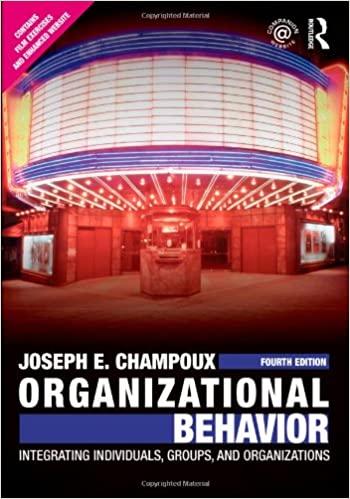Question
In crisis and trauma counseling, provide a definition of crisis and discuss earlier theories of crisis intervention as well as current perspectives on crisis theory.
In crisis and trauma counseling, provide a definition of crisis and discuss earlier theories of crisis intervention as well as current perspectives on crisis theory. Support your answer with references to the case study.
The case study is as follows: You have just been appointed as a counsellor at a high school in Gauteng (South Africa). The high school is situated in an urban area and is reasonably well-resourced. The school has 1400 learners and 23 teachers. The school offers a range of academic subjects as well as various sporting codes and extra-curricular activities. The school's student wellness policy states that learners have access to six sessions with a counsellor. As and when necessary, the counsellor is required to refer a client to a more experienced practitioner (e.g. psychologist, doctor, social worker, etc.). A concerned teacher referred Emma to you. Emma is 16 years old, in Grade 10 and is generally a below-average school achiever (she just passes). The recent onset of sadness, unexplained tearfulness, difficulty concentrating, and struggles with sleeping is part of the presenting complaint. These are the reasons the teacher has referred Emma to you. You have a small private office on the school premises and Emma comes to you after her last class of the day. You have a one-and-a-half-hour session with her. You begin your session and Emma confirms her sleepless nights, difficulties with concentration, and appears sad and tearful. Emma then starts talking and shares with you - in a rather soft voice - that she feels ashamed of her body, is rapidly gaining weight, and adds that she does not feel like going to school in the mornings and would rather sit at home in front of the TV. She also mentions she is behind with her schoolwork, and considering that it is September, preparations for the final exams will soon commence. She tells you that her mother works as a bookkeeper and that her mother and father separated a year ago. Her father seldom makes contact with her and forgot to phone her on her birthday. She has no idea whether divorce proceedings are underway but indicated that her father is cohabiting with his new girlfriend, who Emma has met on two occasions and seemingly dislikes. Emma's boyfriend of over a year, who is in matric at the same school, has also recently stopped contacting her and has not responded to her WhatsApp messages. She also thinks he has defriended her on Facebook. She thinks it is because of her weight gain, adding that her gym teacher recently told her in the gym class "she was getting too fat" in front of the other learners. Two nights ago, her mother came to her and asked her to try to get a part-time evening and weekend job (as a restaurant server) to help with the finances, as her father was defaulting on his financial maintenance. Emma has a younger brother who is in Grade 5. She takes care of him during the afternoon, helps with his homework, and walks him to the soccer field for practice every evening. She is very close to her brother. She complained that she feels like a burden to everyone and that for the last few days, she wishes she could go to sleep and never wake up. She tells you that she is unable to talk to her mother, who returns home in the late evening, is often grumpy, and has her own problems. Emma says that her mother is depressed. During her session with you, Emma says, "I would just like to go to sleep and never wake up. I am a burden to everyone, and no one seems to like me". Her eyes brimming with tears she looks up at you and says "I'm not sure how you can help me, can you?"
- a. Provide a referenced definition of the term 'crisis'.
- b. Identify and explain ONE theory that was used in the past to help people in crisis and apply it to the case study.
- c. Identify and explain ONE current theory that is used to understand and help people in crisis and apply it to the case study.
- d. Use the information from the case study to explain how the theories mentioned in (b) & (c) would make sense of (interpret) the events in the case study.
- e. Overall, show an understanding of the concept of crisis, how people have traditionally responded to crisis situations, and how modern theories have evolved to better support people in crisis/need.
Step by Step Solution
3.41 Rating (157 Votes )
There are 3 Steps involved in it
Step: 1
a Definition of Crisis A crisis can be defined as a state of emotional turmoil or distress experienced by an individual when they perceive their coping abilities to be insufficient for dealing with a ...
Get Instant Access to Expert-Tailored Solutions
See step-by-step solutions with expert insights and AI powered tools for academic success
Step: 2

Step: 3

Ace Your Homework with AI
Get the answers you need in no time with our AI-driven, step-by-step assistance
Get Started


